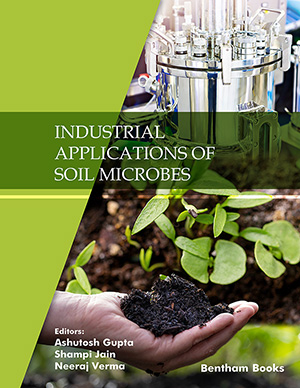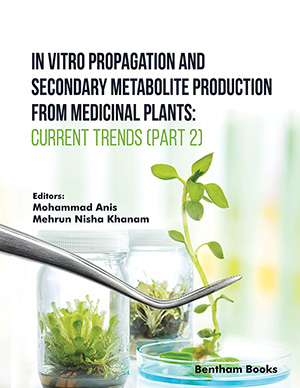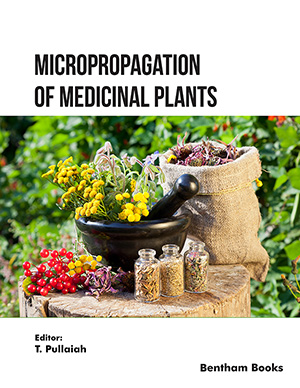Abstract
Background: Ovarian cancer is the most lethal gynecologic malignancy worldwide with poor prognosis owing to chemotherapy resistance and cancer relapse. Hence, there is an urgent need to develop novel anticancer agents against ovarian cancer.
Objective: The aim of this research is to investigate the possible anticancer activity of aloperine, an active ingredient from a traditional Chinese medicine Sophora alopecuroides, and to explore the possible Reactive Oxygen Species (ROS)-related mechanism. Methods: Cell viability, cytotoxicity, apoptosis, ROS generation, and oxidant stress indicators were analyzed. Results: Our results demonstrated that aloperine significantly induced inhibition of cell viability, promoted cytotoxicity and mitochondrial-related apoptosis, and increased ROS generation in ovarian cancer cells. Furthermore, the antioxidant α-lipoic acid reversed apoptosis in aloperinetreated cells. In addition, we identified hydrogen peroxide as the main type of ROS, and the antioxidant catalase suppressed the apoptotic inducing effect of aloperine whereas hydrogen peroxide supplement exacerbated the effect of aloperine in ovarian cancer cells. Conclusion: Taken together, our results indicated that aloperine could exert anti-ovarian cancer cell activity through a reactive oxygen species activation mechanism and suggested aloperine as a potential agent against ovarian cancer.Keywords: Aloperine, ROS, hydrogen peroxide, apoptosis, Sophora alopecuroides, human ovarian cancer cells.
[1]
Bray, F.; Ferlay, J.; Soerjomataram, I.; Siegel, R.L.; Torre, L.A.; Jemal, A. Global cancer statistics 2018: GLOBOCAN estimates of incidence and mortality worldwide for 36 cancers in 185 countries. Cancer J. Clin., 2018, 68(6), 394-424.
[http://dx.doi.org/10.3322/caac.21492] [PMID: 30207593]
[http://dx.doi.org/10.3322/caac.21492] [PMID: 30207593]
[2]
Matulonis, U.A.; Sood, A.K.; Fallowfield, L.; Howitt, B.E.; Sehouli, J.; Karlan, B.Y. Ovarian cancer. Nat. Rev. Dis. Primers, 2016, 2, 16061.
[http://dx.doi.org/10.1038/nrdp.2016.61] [PMID: 27558151]
[http://dx.doi.org/10.1038/nrdp.2016.61] [PMID: 27558151]
[3]
La Vecchia, C. Ovarian cancer: Epidemiology and risk factors. Eur. J. Cancer Prev., 2017, 26(1), 55-62.
[http://dx.doi.org/10.1097/CEJ.0000000000000217]
[http://dx.doi.org/10.1097/CEJ.0000000000000217]
[4]
Jayson, G.C.; Kohn, E.C.; Kitchener, H.C.; Ledermann, J.A. Ovarian cancer. Lancet, 2014, 384(9951), 1376-1388.
[http://dx.doi.org/10.1016/S0140-6736(13)62146-7] [PMID: 24767708]
[http://dx.doi.org/10.1016/S0140-6736(13)62146-7] [PMID: 24767708]
[5]
Torre, L.A.; Trabert, B.; DeSantis, C.E.; Miller, K.D.; Samimi, G.; Runowicz, C.D.; Gaudet, M.M.; Jemal, A.; Siegel, R.L. Ovarian cancer statistics, 2018. CA Cancer J. Clin., 2018, 68(4), 284-296.
[http://dx.doi.org/10.3322/caac.21456] [PMID: 29809280]
[http://dx.doi.org/10.3322/caac.21456] [PMID: 29809280]
[6]
Liao, Y.H.; Li, C.I.; Lin, C.C.; Lin, J.G.; Chiang, J.H.; Li, T.C. Traditional Chinese medicine as adjunctive therapy improves the long-term survival of lung cancer patients. J. Cancer Res. Clin. Oncol., 2017, 143(12), 2425-2435.
[http://dx.doi.org/10.1007/s00432-017-2491-6] [PMID: 28803328]
[http://dx.doi.org/10.1007/s00432-017-2491-6] [PMID: 28803328]
[7]
Atta, U.R.A.; Choudhary, M.K.; Ahmed, A.; Akhtar, F.; Nur, E.A.M.; Hassan, N. Quinolizidine alkaloids from Sophora alopecuroides. J. Nat. Prod., 2000, 63(2), 190-192.
[http://dx.doi.org/10.1021/np990351v]
[http://dx.doi.org/10.1021/np990351v]
[8]
Xu, Z.; Zhang, F.; Bai, C.; Yao, C.; Zhong, H.; Zou, C.; Chen, X. Sophoridine induces apoptosis and S phase arrest via ROS-dependent JNK and ERK activation in human pancreatic cancer cells. J. Exp. Clin. Cancer Res., 2017, 36(1), 124.
[http://dx.doi.org/10.1186/s13046-017-0590-5] [PMID: 28893319]
[http://dx.doi.org/10.1186/s13046-017-0590-5] [PMID: 28893319]
[9]
Zhou, Y.J.; Guo, Y.J.; Yang, X.L.; Ou, Z.L. Anti-cervical cancer role of matrine, oxymatrine and Sophora flavescens alkaloid gels and its mechanism. J. Cancer, 2018, 9(8), 1357-1364.
[http://dx.doi.org/10.7150/jca.22427] [PMID: 29721044]
[http://dx.doi.org/10.7150/jca.22427] [PMID: 29721044]
[10]
Zhang, P.P.; Wang, P.Q.; Qiao, C.P.; Zhang, Q.; Zhang, J.P.; Chen, F.; Zhang, X.; Xie, W.F.; Yuan, Z.L.; Li, Z.S.; Chen, Y.X. Differentiation therapy of hepatocellular carcinoma by inhibiting the activity of AKT/GSK-3β/β-catenin axis and TGF-β induced EMT with sophocarpine. Cancer Lett., 2016, 376(1), 95-103.
[http://dx.doi.org/10.1016/j.canlet.2016.01.011] [PMID: 26945965]
[http://dx.doi.org/10.1016/j.canlet.2016.01.011] [PMID: 26945965]
[11]
Huang, H.; Wang, Q.; Du, T.; Lin, C.; Lai, Y.; Zhu, D.; Wu, W.; Ma, X.; Bai, S.; Li, Z.; Liu, L.; Li, Q. Matrine inhibits the progression of prostate cancer by promoting expression of GADD45B. Prostate, 2018, 78(5), 327-335.
[http://dx.doi.org/10.1002/pros.23469] [PMID: 29356020]
[http://dx.doi.org/10.1002/pros.23469] [PMID: 29356020]
[12]
Liu, W.; Zhang, B.; Chen, G.; Wu, W.; Zhou, L.; Shi, Y.; Zeng, Q.; Li, Y.; Sun, Y. Deng, X Targeting miR-21 with sophocarpine inhibits tumor progression and reverses epithelial-mesenchymal transition in head and neck cancer. Mol. Ther., 2017, 25(9), 2129-2139.
[http://dx.doi.org/10.1016/j.ymthe.2017.05.008]
[http://dx.doi.org/10.1016/j.ymthe.2017.05.008]
[13]
Tian, D.; Li, Y.; Li, X.; Tian, Z. Aloperine inhibits proliferation, migration and invasion and induces apoptosis by blocking the Ras signaling pathway in human breast cancer cells. Mol. Med. Rep., 2018, 18(4), 3699-3710.
[http://dx.doi.org/10.3892/mmr.2018.9419] [PMID: 30132540]
[http://dx.doi.org/10.3892/mmr.2018.9419] [PMID: 30132540]
[14]
Ling, Z.; Guan, H.; You, Z.; Wang, C.; Hu, L.; Zhang, L.; Wang, Y.; Chen, S.; Xu, B.; Chen, M. Aloperine executes antitumor effects through the induction of apoptosis and cell cycle arrest in prostate cancer in vitro and in vivo. OncoTargets Ther., 2018, 11, 2735-2743.
[http://dx.doi.org/10.2147/OTT.S165262] [PMID: 29785122]
[http://dx.doi.org/10.2147/OTT.S165262] [PMID: 29785122]
[15]
Lee, Y.R.; Chen, S.H.; Lin, C.Y.; Chao, W.Y.; Lim, Y.P.; Yu, H.I.; Lu, C.H. In vitro antitumor activity of aloperine on human thyroid cancer cells through caspase-dependent apoptosis. Int. J. Mol. Sci., 2018, 19(1), E312.
[http://dx.doi.org/10.3390/ijms19010312] [PMID: 29361731]
[http://dx.doi.org/10.3390/ijms19010312] [PMID: 29361731]
[16]
Chen, S.; Jin, Z.; Dai, L.; Wu, H.; Wang, J.; Wang, L.; Zhou, Z.; Yang, L.; Gao, W. Aloperine induces apoptosis and inhibits invasion in MG-63 and U2OS human osteosarcoma cells. Biomed. Pharmacother., 2017, 97, 45-52.
[17]
Wang, H.; Yang, S.; Zhou, H.; Sun, M.; Du, L.; Wei, M.; Luo, M.; Huang, J.; Deng, H.; Feng, Y.; Huang, J.; Zhou, Y. Aloperine executes antitumor effects against multiple myeloma through dual apoptotic mechanisms. J. Hematol. Oncol., 2015, 8, 26.
[http://dx.doi.org/10.1186/s13045-015-0120-x] [PMID: 25886453]
[http://dx.doi.org/10.1186/s13045-015-0120-x] [PMID: 25886453]
[18]
Zhang, L.; Zheng, Y.; Deng, H.; Liang, L.; Peng, J. Aloperine induces G2/M phase cell cycle arrest and apoptosis in HCT116 human colon cancer cells. Int. J. Mol. Med., 2014, 33(6), 1613-1620.
[http://dx.doi.org/10.3892/ijmm.2014.1718] [PMID: 24682388]
[http://dx.doi.org/10.3892/ijmm.2014.1718] [PMID: 24682388]
[19]
Kang, S.W.; Lee, S.; Lee, E.K. ROS and energy metabolism in cancer cells: Alliance for fast growth. Arch. Pharm. Res., 2015, 38(3), 338-345.
[http://dx.doi.org/10.1007/s12272-015-0550-6] [PMID: 25599615]
[http://dx.doi.org/10.1007/s12272-015-0550-6] [PMID: 25599615]
[20]
Saed, G.M.; Diamond, M.P.; Fletcher, N.M. Updates of the role of oxidative stress in the pathogenesis of ovarian cancer. Gynecol. Oncol., 2017, 145(3), 595-602.
[http://dx.doi.org/10.1016/j.ygyno.2017.02.033] [PMID: 28237618]
[http://dx.doi.org/10.1016/j.ygyno.2017.02.033] [PMID: 28237618]
[21]
Ray, P.D.; Huang, B.W.; Tsuji, Y. Reactive oxygen species (ROS) homeostasis and redox regulation in cellular signaling. Cell. Signal., 2012, 24(5), 981-990.
[http://dx.doi.org/10.1016/j.cellsig.2012.01.008] [PMID: 22286106]
[http://dx.doi.org/10.1016/j.cellsig.2012.01.008] [PMID: 22286106]
[22]
Qiu, M.; Chen, L.; Tan, G.; Ke, L.; Zhang, S.; Chen, H.; Liu, J. A reactive oxygen species activation mechanism contributes to JS-K-induced apoptosis in human bladder cancer cells. Sci. Rep., 2015, 5, 15104.
[http://dx.doi.org/10.1038/srep15104] [PMID: 26458509]
[http://dx.doi.org/10.1038/srep15104] [PMID: 26458509]
[23]
Hu, S.; Zhang, Y.; Zhang, M.; Guo, Y.; Yang, P.; Zhang, S.; Simsekyilmaz, S.; Xu, J.F.; Li, J.; Xiang, X.; Yu, Q.; Wang, C.Y. Aloperine protects mice against Ischemia-Reperfusion (IR)-induced renal injury by regulating PI3K/AKT/mTOR signaling and AP-1 activity. Mol. Med., 2016, 21(1), 912-923.
[http://dx.doi.org/10.2119/molmed.2015.00056] [PMID: 26552059]
[http://dx.doi.org/10.2119/molmed.2015.00056] [PMID: 26552059]
[24]
Circu, M.L.; Aw, T.Y. Reactive oxygen species, cellular redox systems, and apoptosis. Free Radic. Biol. Med., 2010, 48(6), 749-762.
[http://dx.doi.org/10.1016/j.freeradbiomed.2009.12.022] [PMID: 20045723]
[http://dx.doi.org/10.1016/j.freeradbiomed.2009.12.022] [PMID: 20045723]
[25]
Marzvanyan, A.; Chen, V.; Zhang, B.; Asatrian, G. Herbal medicine in the mitigation of reactive oxygen species, autophagy, and cancer: A review. Crit. Rev. Oncog., 2018, 23(5-6), 333-346.
[http://dx.doi.org/10.1615/CritRevOncog.2018027408] [PMID: 30311564]
[http://dx.doi.org/10.1615/CritRevOncog.2018027408] [PMID: 30311564]
[26]
Tan, C.; Qian, X.; Jia, R.; Wu, M.; Liang, Z. Matrine induction of reactive oxygen species activates p38 leading to caspase-dependent cell apoptosis in non-small cell lung cancer cells. Oncol. Rep., 2013, 30(5), 2529-2535.
[http://dx.doi.org/10.3892/or.2013.2727] [PMID: 24026034]
[http://dx.doi.org/10.3892/or.2013.2727] [PMID: 24026034]
[27]
Liu, Y.; Hyde, A.S.; Simpson, M.A.; Barycki, J.J. Emerging regulatory paradigms in glutathione metabolism. Adv. Cancer Res., 2014, 122, 69-101.
[http://dx.doi.org/10.1016/B978-0-12-420117-0.00002-5] [PMID: 24974179]
[http://dx.doi.org/10.1016/B978-0-12-420117-0.00002-5] [PMID: 24974179]
[28]
Franco, R; Cidlowski, J.A. Glutathione efflux and cell death. Antioxid. Redox. SIgnal., 2012, 17(12), 1694-1713.
[29]
Traverso, N.; Ricciarelli, R.; Nitti, M.; Marengo, B.; Furfaro, A.L.; Pronzato, M.A.; Marinari, U.M.; Domenicotti, C. Role of glutathione in cancer progression and chemoresistance. Oxid. Med. Cell. Longev., 2013, 2013, 972913.
[http://dx.doi.org/10.1155/2013/972913] [PMID: 23766865]
[http://dx.doi.org/10.1155/2013/972913] [PMID: 23766865]
[30]
Brigelius-Flohé, R.; Maiorino, M. Glutathione peroxidases. Biochim. Biophys. Acta, 2013, 1830(5), 3289-3303.
[http://dx.doi.org/10.1016/j.bbagen.2012.11.020] [PMID: 23201771]
[http://dx.doi.org/10.1016/j.bbagen.2012.11.020] [PMID: 23201771]
[31]
Hjortsø, M.D.; Andersen, M.H. The expression, function and targeting of haem oxygenase-1 in cancer. Curr. Cancer Drug Targets, 2014, 14(4), 337-347.
[http://dx.doi.org/10.2174/1568009614666140320111306] [PMID: 24655000]
[http://dx.doi.org/10.2174/1568009614666140320111306] [PMID: 24655000]
[32]
Chau, L.Y. Heme oxygenase-1: Emerging target of cancer therapy. J. Biomed. Sci., 2015, 22, 22.
[http://dx.doi.org/10.1186/s12929-015-0128-0] [PMID: 25885228]
[http://dx.doi.org/10.1186/s12929-015-0128-0] [PMID: 25885228]
[33]
Bhatti, J.S.; Bhatti, G.K.; Reddy, P.H. Mitochondrial dysfunction and oxidative stress in metabolic disorders - A step towards mitochondria based therapeutic strategies. Biochim. Biophys. Acta Mol. Basis Dis., 2017, 1863(5), 1066-1077.
[http://dx.doi.org/10.1016/j.bbadis.2016.11.010] [PMID: 27836629]
[http://dx.doi.org/10.1016/j.bbadis.2016.11.010] [PMID: 27836629]
[34]
Srinivasan, S.; Guha, M.; Kashina, A.; Avadhani, N.G. Mitochondrial dysfunction and mitochondrial dynamics-The cancer connection. Biochim. Biophys. Acta Bioenerg., 2017, 1858(8), 602-614.
[http://dx.doi.org/10.1016/j.bbabio.2017.01.004] [PMID: 28104365]
[http://dx.doi.org/10.1016/j.bbabio.2017.01.004] [PMID: 28104365]
[35]
Ghobrial, I.M.; Witzig, T.E.; Adjei, A.A. Targeting apoptosis pathways in cancer therapy. CA Cancer J. Clin., 2005, 55(3), 178-194.
[http://dx.doi.org/10.3322/canjclin.55.3.178] [PMID: 15890640]
[http://dx.doi.org/10.3322/canjclin.55.3.178] [PMID: 15890640]
[36]
Wang, Y.; Zhong, J.; Bai, J.; Tong, R.; An, F.; Jiao, P.; He, L.; Zeng, D.; Long, E.; Yan, J.; Yu, J.; Cai, L. The application of natural products in cancer therapy by targeting apoptosis pathways. Curr. Drug Metab., 2018, 19(9), 739-749.
[http://dx.doi.org/10.2174/1389200219666180511154722] [PMID: 29749309]
[http://dx.doi.org/10.2174/1389200219666180511154722] [PMID: 29749309]
[37]
Ow, Y.P.; Green, D.R.; Hao, Z.; Mak, T.W. Cytochrome c: Functions beyond respiration. Nat. Rev. Mol. Cell Biol., 2008, 9(7), 532-542.
[http://dx.doi.org/10.1038/nrm2434] [PMID: 18568041]
[http://dx.doi.org/10.1038/nrm2434] [PMID: 18568041]
[38]
Kim, B.; Srivastava, S.K.; Kim, S.H. Caspase-9 as a therapeutic target for treating cancer. Expert Opin. Ther. Targets, 2015, 19(1), 113-127.
[http://dx.doi.org/10.1517/14728222.2014.961425] [PMID: 25256701]
[http://dx.doi.org/10.1517/14728222.2014.961425] [PMID: 25256701]
[39]
Adams, J.M.; Cory, S. The Bcl-2 protein family: Arbiters of cell survival. Science, 1998, 281(5381), 1322-1326.
[http://dx.doi.org/10.1126/science.281.5381.1322] [PMID: 9735050]
[http://dx.doi.org/10.1126/science.281.5381.1322] [PMID: 9735050]
[40]
Norberg, E.; Orrenius, S.; Zhivotovsky, B. Mitochondrial regulation of cell death: Processing of apoptosis-inducing factor (AIF). Biochem. Biophys. Res. Commun., 2010, 396(1), 95-100.
[http://dx.doi.org/10.1016/j.bbrc.2010.02.163] [PMID: 20494118]
[http://dx.doi.org/10.1016/j.bbrc.2010.02.163] [PMID: 20494118]
[41]
Nicholson, D.W.; Thornberry, N.A. Caspases: Killer proteases. Trends Biochem. Sci., 1997, 22(8), 299-306.
[http://dx.doi.org/10.1016/S0968-0004(97)01085-2] [PMID: 9270303]
[http://dx.doi.org/10.1016/S0968-0004(97)01085-2] [PMID: 9270303]
[42]
Zou, Z.; Chang, H.; Li, H.; Wang, S. Induction of reactive oxygen species: An emerging approach for cancer therapy. Apoptosis, 2017, 22(11), 1321-1335.
[http://dx.doi.org/10.1007/s10495-017-1424-9]
[http://dx.doi.org/10.1007/s10495-017-1424-9]
[43]
Glorieux, C.; Calderon, P.B. Catalase, a remarkable enzyme: Targeting the oldest antioxidant enzyme to find a new cancer treatment approach. Biol. Chem., 2017, 398(10), 1095-1108.
[http://dx.doi.org/10.1515/hsz-2017-0131] [PMID: 28384098]
[http://dx.doi.org/10.1515/hsz-2017-0131] [PMID: 28384098]






























